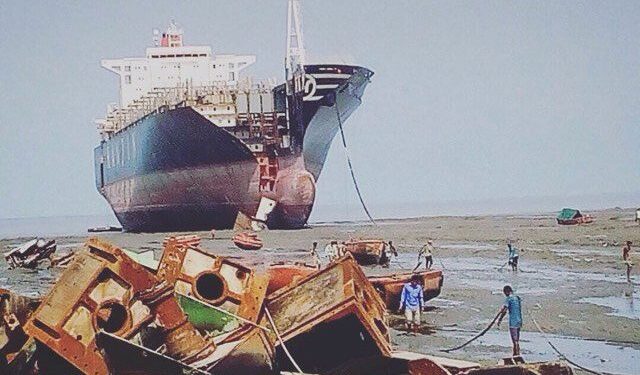The Brazilian CONTTMAF trade union federation and its member SINDMAR have recently criticized the shipbreaking practices of Transpetro, a Petrobras subsidiary, majority-owned by the State, according to the NGO Shipbreaking Platform. In the last five years, more than twenty vessels owned by the oil and gas company have been dismantled on the beaches of India and Pakistan, where shipbreaking activities endanger both workers and the environment.
More specifically, in an official letter sent on 2 June 2017 to Transpetro, Severino Almeida, president of CONTTMAF and SINDMAR, expresses his serious concerns that public money has been used to build ships that now put workers’ lives at risk and pollute the environment in developing countries.
NGO Shipbreaking Platform also informed that at least six more units owned by Petrobras have already been sold for demolition, but are still in Brazilian territorial waters. Four drill platforms were bought in a public auction by the cash-buyer Rota Shipping who exclusively delivers to Turkish yards and was able to offer just 180,000 USD more than Alfa Ship Trading, a cash-buyer who only sends to India. On the other hand, the product tanker LOBATO and the liquefied petroleum gas carrier GUAPORE have been sold by Petrobras to Indian breakers.
Petrobras is not the only Brazilian company involved in such dangerous practices, as the Brazilian Vale has also sold five ships to shipbreaking beaches in Bangladesh and Pakistan in the last two years, where at least 79 workers were severely injured and 55 died in 2016.
“In order to ensure clean and safe ship recycling off the beach, we demand stricter requirements for the public auctions of Petrobras’ end-of-life vessels and the enforcement of international legislation on hazardous waste exports. The vessels could even be recycled in Brazil”, stated Carlos Müller, CONTTMAF’s and SINDMAR’s Director.
A committee coordinated by the Ministry of Labour and Employment, with the presence of the Brazilian Navy and Petrobras itself, is now considering the possibility to include ship recycling in the scope of national regulation NR 34, which sets environmental and safety requirements for ship building and offshore constructions, including repair activities.
“Widening the scope of regulation NR 34 is certainly a step in the right direction. Should Brazil be serious about starting to use the dormant national ship recycling capacity, we call on all interested Brazilian yards to follow the standards set in the EU Ship Recycling Regulation and to apply to be included in the upcoming EU List of approved ship recycling facilities,” said Nicola Mulinaris, Communication and Policy Officer of the NGO Shipbreaking Platform.






























































